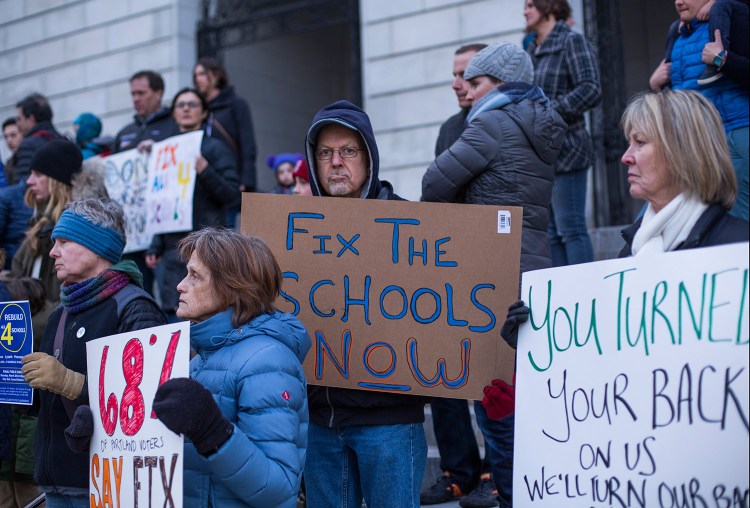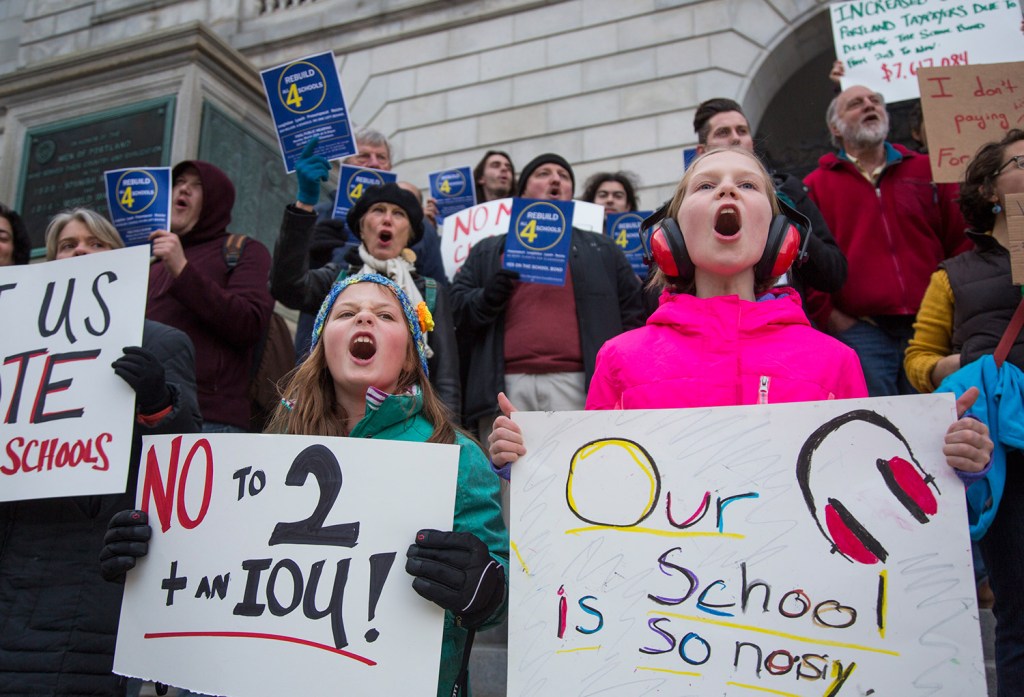An effort to put a $64 million schools renovation bond before Portland voters is wounded, but still alive, even though the measure failed to receive the seven votes needed to move forward.
The Portland City Council voted 6-3 early Tuesday to ask taxpayers to fully fund renovations at Lyseth, Longfellow, Presumpscot and Reiche elementary schools. Councilors Jill Duson, Nicholas Mavodones and Belinda Ray dissented because they wanted to preserve the opportunity to receive up to $32 million in state funding for as many as two schools that barely missed in the last funding cycle. The state funding would lower the amount the city would need to bond to cover renovations, thereby lowering the debt burden on Portland residents.
While the bond didn’t receive seven votes, council rules dictate that the proposal will continue to appear on subsequent agendas until it’s disposed of, meaning until it is passed – either in the current or amended form – or is indefinitely postponed, which would effectively kill it.
Neither side appeared willing to cede any territory Tuesday, setting up another showdown next week.
Supporters of the full bond rallied at City Hall on Tuesday night in an effort to pressure one of the three dissenters to change their vote.
“I’m going to spend every day this week trying to figure out how to get that seventh vote,” said Mayor Ethan Strimling, who has made the school bond a priority this year. “People have the right to vote on $64 million. I’m very disappointed we did not give the voters that right last night.”
The bond is being proposed to upgrade a variety of facility and educational needs at the schools. Upgrades include eliminating modular classrooms, improving accessibility for disabled students, adding gymnasiums and providing additional space for classrooms, counseling and health care.
Borrowed in stages over the next six years, the $64 million bond would result in an additional $92 million in debt after interest. Property taxes are projected to increase by 3.1 percent over a 26-year period, adding an average of $104 a year to the tax bill on a $240,000 home, or $2,700 over the life of the bond.
At Monday’s council meeting, which stretched past midnight, all nine councilors, including Strimling, expressed support for renovating the four schools. The only difference was how to pay for it.
More than 60 people spoke in support of the full bond during a three-hour public hearing, because the schools have repeatedly been denied state funding. A handful of people wanted the city to apply for state funding one more time before committing Portland taxpayers to the full costs.
After the council vote, which occurred at 12:30 a.m., supporters briefly chanted, “Let us vote!” before being gaveled into silence by Strimling.
The council will take up the bond again on Monday. Strimling said he will ask the council to re-open public comment.
“This is going to come up at every meeting and we’re going to take a vote on it at every meeting until we get seven.”
In an interview Tuesday, Duson said she’s willing to put the full bond request on the ballot, as long as voters are given the chance to weigh in on her and Mavodones’s so-called “2+2” plan, which would bond repairs at Lyseth and Presumpscot this year and allow the city to seek state funding.
Duson said her plan would rebuild all four schools on the same time line, while giving voters a choice.
“It’s important to try to separate out trying to win a political battle and trying to get these schools done,” Duson said. “We can’t leave it the way we did last night. If we do, Portland kids will be the loser. We can’t turn this into an all-or-nothing fight.”
Duson said the city can expect reductions in state and federal funding in the coming months. She noted that the original school budget proposal for next year asked for a 6.5 percent property tax increase, which would raise property taxes on a $250,000 home by $167. Portland Superintendent Xavier Botana shaved the proposed school budget by $1.1 million Tuesday night, bringing the tax impact to below 5 percent. The increase does not include any bond payments, or anticipated increases in the city’s side of the budget.
The state periodically accepts applications for state-funded school construction projects and ranks them according to need. The next round of applications is due in April and the state is expected to release its rankings by the fall of 2018.
If the city does not fare well in the next state rankings, Duson said, the city could ask taxpayers to fund the two remaining schools, Longfellow and Reiche.
“I can’t get myself to the point to say ‘no’ to the resources we’re eligible for,” she said, noting that Portland is a major contributor to the state’s school construction fund.
Adding another bond option on the ballot would lead to a two- to four-week delay because the city would have to post the proposal and hold another public hearing. That means the council vote would likely come after the April 5 deadline to make the June ballot. If that occurs, the bond would go to voters in November, unless the council decides to hold a special election.
Mavodones said during the meeting that councilors need to consider people who live on fixed incomes, who are struggling to keep their homes while affording food and medicines.
“We have to be mindful of the people who are struggling to pay,” he said.
Opponents of the 2+2 proposal argued that the city is not guaranteed to receive state funding and the current council cannot predict whether a future council would be willing to put an additional bond to voters, should state funding not come to fruition.
Councilor Justin Costa said during the meeting that any changeover on the council will likely lead to another long process of studying and reviewing the needs at the schools, which would inevitably delay or jeopardize the upgrades at two of the city’s neediest schools. He predicted the city rankings would remain about the same – close to getting state funding, but not guaranteed.
“This is realistically as good as it gets,” Costa said of the full bond. “It’s time for us to turn this over to the voters and they can tell us what they think.”
Councilor Ray also presented an alternative proposal that would preserve the chance at state funding. But her $24 million proposal was voted down 8-1, despite being applauded for its creativity and thoughtfulness by several councilors.
Randy Billings can be contacted at 791-6346 or at:
Send questions/comments to the editors.





Comments are no longer available on this story